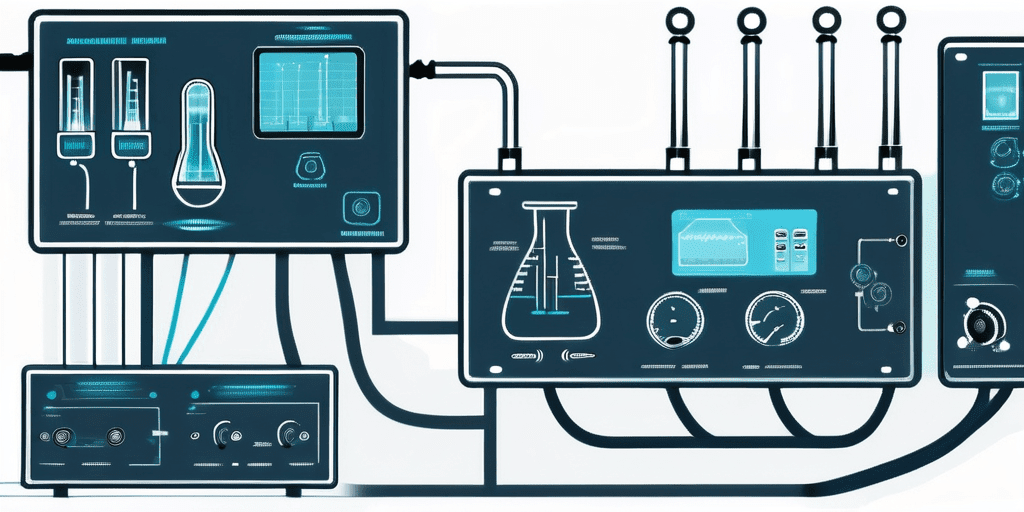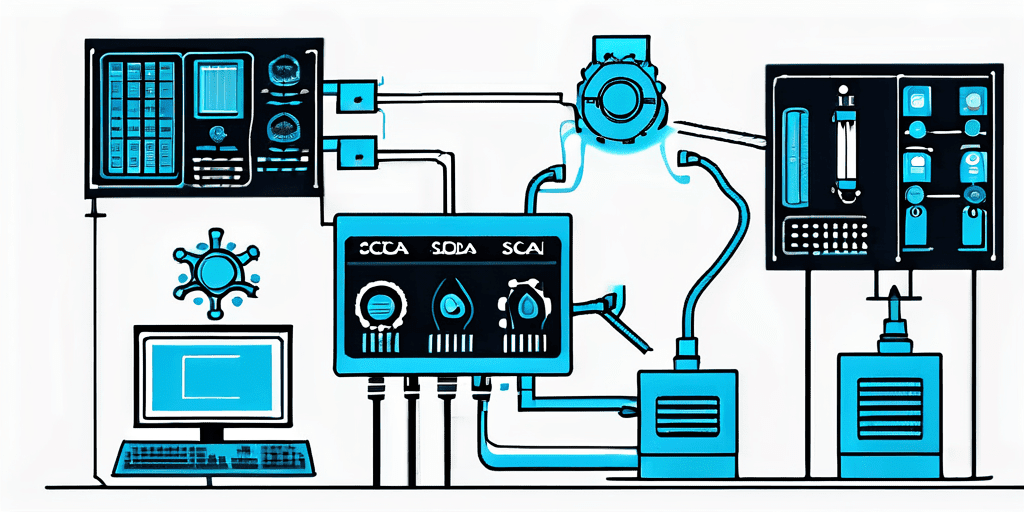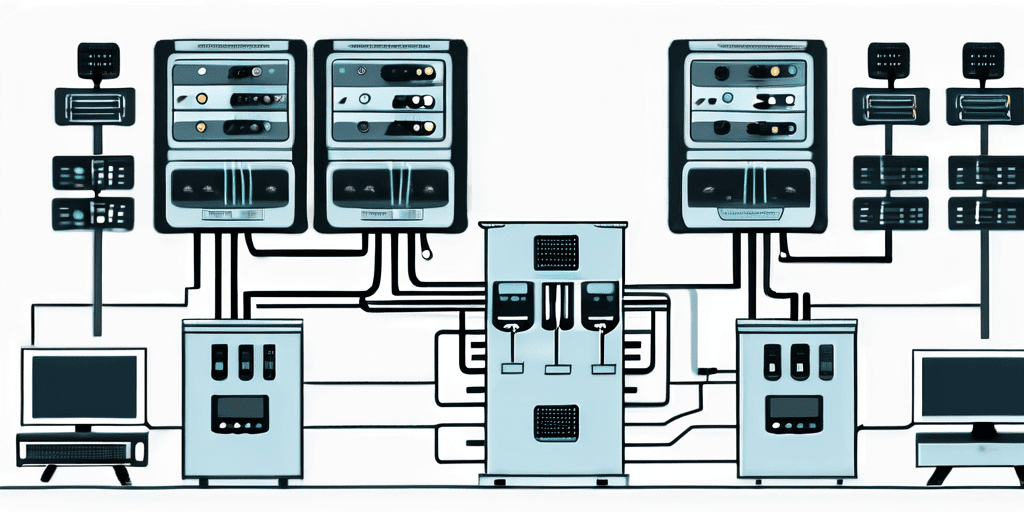Two buzzwords frequently come up in industrial control systems: SCADA and ICS. While they may sound similar, there are distinct differences between the two that every industry professional should be aware of. In this article, we will delve into the intricacies of SCADA and ICS, exploring their definitions, core functions, key differences, considerations when choosing between them, and the future trends shaping their evolution.
Understanding SCADA and ICS
These systems play a crucial role in the smooth operation of various industries, ensuring efficiency and reliability in industrial processes.

SCADA, short for Supervisory Control and Data Acquisition, acts as the nerve center of industrial control systems. It enables operators to monitor and manage remote equipment in real-time, providing a comprehensive view of the production environment. Beyond data acquisition, SCADA systems facilitate decision-making by offering intuitive graphical interfaces that display critical information at a glance. This visual representation empowers operators to respond promptly to anomalies or emergencies, optimizing production efficiency.
SCADA systems are designed to be versatile and scalable, catering to various industries such as oil and gas, water treatment, and manufacturing. The central server acts as the brain of the operation, processing data from remote terminals and field devices to ensure seamless coordination. These field devices, including sensors and actuators, play a vital role in collecting data and executing control commands based on the instructions received from the central server.
Regarding ICS or Industrial Control System, the scope expands to encompass a comprehensive array of control technologies beyond SCADA. In addition to supervisory control, ICS includes Distributed Control Systems (DCS), which focus on localized control within specific processes, and Programmable Logic Controllers (PLC), which automate tasks based on pre-programmed logic. Human Machine Interfaces (HMI) serve as the bridge between operators and the control system, offering a user-friendly interface for monitoring and interacting with the industrial processes.
Industrial Control Systems are the backbone of critical infrastructure, ensuring the seamless operation of power plants, transportation systems, and other essential facilities. Integrating various control components under the umbrella of ICS highlights the interconnected nature of modern industrial automation, where different systems work harmoniously to achieve operational excellence.
The Core Functions of SCADA and ICS
Now that we have a basic understanding of SCADA and ICS, let’s explore their core functions and how they contribute to industrial control.

Supplementing the intricate world of SCADA and ICS with further insight reveals the depth of their impact on industrial processes. These systems are not merely technological tools but the backbone of modern industrial control, shaping how operations are managed and optimized.
The Role of SCADA in Industrial Control
SCADA is the nerve center of industrial control, overseeing processes, collecting operational data, and enabling efficient decision-making. It provides real-time monitoring capabilities, alerts system operators of any anomalies, and allows for remote equipment control. By integrating various systems and devices, SCADA optimizes operations, reduces downtime, and enhances overall productivity.
Delving deeper into SCADA reveals its ability to streamline operations and enhance cybersecurity measures. With the rise of cyber threats targeting industrial systems, SCADA plays a crucial role in implementing robust security protocols to safeguard critical infrastructure from potential breaches and attacks.
The Role of ICS in Industrial Control
ICS, as a larger umbrella term, incorporates SCADA while encompassing additional control system components. Its primary function is to manage and control all aspects of industrial operations, ensuring safety, reliability, and efficiency. ICS integrates multiple systems to achieve seamless communication and coordination between different parts of the infrastructure, enabling precise control and automation.
The evolution of ICS has led to the integration of advanced technologies such as artificial intelligence and machine learning. These innovations empower industrial control systems to adapt dynamically to changing operational conditions, predict maintenance requirements, and optimize resource utilization, ushering in a new era of smart and autonomous industrial environments.
Main Differences Between SCADA and ICS
While SCADA and ICS share common industrial control goals, they do have notable differences in terms of operational, technological, and security aspects.
Understanding these differences is crucial for industries looking to implement the most suitable control systems for their specific operational needs.
Operational Differences
SCADA systems are designed for supervisory control, emphasizing data acquisition, remote monitoring, and operator interface. They are ideal for industries where real-time data collection and monitoring are paramount, such as water treatment plants and power distribution networks. On the other hand, ICS encompasses a broader range of control systems and focuses on complete control and management of industrial operations, making it more suitable for complex manufacturing processes and critical infrastructure.
Technological Differences
Technologically, SCADA predominantly utilizes standard communication protocols like Modbus and Ethernet to interface with field devices. This standardized approach simplifies integration and maintenance but may limit customization options. In contrast, ICS employs diverse technologies like Distributed Control Systems (DCS), Programmable Logic Controllers (PLCs), and Human-Machine Interfaces (HMIs), offering more flexibility in system design and functionality. This versatility allows industries to tailor their control systems to meet specific operational requirements, making ICS a preferred choice for industries with unique process control needs.
Cybersecurity Differences
One critical area where SCADA and ICS differ is security. Historically, SCADA systems have been built with less consideration for cybersecurity and are often more susceptible to attacks. The interconnected nature of SCADA systems, combined with their reliance on legacy hardware and software, poses significant vulnerabilities that malicious actors can exploit. In contrast, ICS incorporates advanced security measures, such as network segregation, intrusion detection systems, and strong access controls, to safeguard critical infrastructure from cyber threats. By implementing robust cybersecurity protocols, ICS enhances the resilience of industrial control systems against evolving cyber risks, ensuring the uninterrupted operation of vital processes.
Choosing Between SCADA and ICS
When deciding between SCADA (Supervisory Control and Data Acquisition) and ICS (Industrial Control Systems), various factors must be carefully evaluated to ensure that the chosen system perfectly aligns with an industry’s specific requirements.

One significant factor to consider is the level of cybersecurity required by the industry. With increasing cyber threats targeting industrial systems, selecting a system with robust security features is paramount. ICS typically offers more advanced security protocols than SCADA, making it a preferred choice for industries where data protection is a top priority.
Another crucial aspect to ponder is the ease of maintenance and system updates. SCADA systems are known for their user-friendly interfaces, making them easier to maintain and update. On the other hand, with its intricate control systems, ICS may require specialized knowledge for maintenance, potentially leading to higher operational costs in the long run.
Factors to Consider
Industry-specific needs, operational goals, scalability, integration capabilities, and long-term growth plans should all factor into the decision-making process. Understanding the scope and complexity of the industrial processes at hand will help determine which system best suits the unique requirements.
Pros and Cons of SCADA
SCADA’s strengths lie in its user-friendly interface, real-time data acquisition, and remote capabilities. However, it may lack the versatility and comprehensive control offered by ICS. Organizations should evaluate whether SCADA’s functionalities align with their immediate needs and how future expansion can be accommodated.
Pros and Cons of ICS
ICS, with its broader scope and diverse set of control systems, presents a more comprehensive solution for industrial operations. Its ability to integrate multiple components ensures a seamless control environment. However, its complexity and higher implementation costs should be weighed against the benefits it provides.
The Future of SCADA and ICS
As technology evolves, SCADA (Supervisory Control and Data Acquisition) and ICS (Industrial Control Systems) are not immune to change.
Emerging Trends in SCADA
Advances in connectivity, edge computing, and data analytics are revolutionizing SCADA systems. Integrating Internet of Things (IoT) devices and cloud-based solutions enables enhanced data collection, analysis, and decision-making.
But what does this mean for the future of SCADA? Imagine a world where SCADA systems not only monitor and control industrial processes but also can predict and prevent potential issues. With the help of machine learning algorithms, SCADA systems can analyze historical data and identify patterns that could indicate a future equipment failure. This proactive approach to maintenance can save companies millions of dollars in downtime and repair costs.
Emerging Trends in ICS
ICS is evolving to meet the demands of modern industries. Integrating machine learning and artificial intelligence (AI) algorithms allows for predictive maintenance and optimization of industrial processes.
However, the future of ICS goes beyond predictive maintenance. Imagine a scenario where ICS optimizes industrial processes and adapts in real-time to changing conditions. With the help of AI algorithms, ICS systems can analyze data from various sensors and adjust parameters accordingly, ensuring optimal performance even in dynamic environments. This level of adaptability can lead to increased productivity, reduced waste, and improved overall efficiency.
How SCADA and ICS Might Evolve Together
As the lines between SCADA and other ICS components blur, we can expect deeper integration and collaboration between these systems. The seamless interoperability of various control systems will lead to more efficient industrial operations, improved cybersecurity measures, and enhanced decision-making capabilities.
Imagine a future where SCADA and ICS work together seamlessly, sharing data in real-time and collaborating to optimize industrial processes. For example, imagine a manufacturing plant where SCADA systems monitor the production line, while ICS systems analyze data from the equipment and adjust parameters to ensure optimal performance. This level of integration can result in increased productivity, reduced downtime, and improved product quality.
Conclusion
SCADA and ICS play critical roles in industrial control but differ in their functions, technologies, and security approaches. Understanding these differences and considering an industry’s specific requirements are crucial when choosing between the two. As technology advances, SCADA and ICS will evolve, enabling more intelligent and connected industrial control environments.
As the industrial landscape advances, the importance of robust cybersecurity measures for SCADA and ICS cannot be overstated. Blue Goat Cyber, with its expertise in B2B cybersecurity services, is at the forefront of protecting critical infrastructure. Our veteran-owned business specializes in medical device cybersecurity, penetration testing, and compliance with HIPAA, FDA, SOC 2, and PCI standards. We are committed to securing your operations against cyber threats. Contact us today for cybersecurity help and partner with a team passionate about safeguarding your business and products.
SCADA and ICS FAQs
SCADA systems are used for controlling industrial processes remotely, while ICS are broader systems that include devices, networks, and controls used in industrial sectors for operational processes.
SCADA systems monitor and control industrial processes automatically through data acquisition from sensors and actuators, providing operators with the ability to remotely control equipment.
These systems are widely used in critical infrastructure sectors like electricity, water, oil and gas, manufacturing, and transportation to ensure operational efficiency and safety.
Given their critical nature, these systems are targets for cyberattacks that could lead to operational disruptions, safety hazards, and economic losses.
Protecting these systems involves implementing cybersecurity measures like network segmentation, regular patching, access control, and monitoring for threats and anomalies.
The future includes greater integration with IoT technologies for enhanced data analytics and operational efficiency, alongside evolving cybersecurity strategies to protect against increasing threats.
